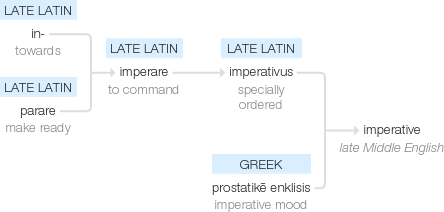Imperative
late Middle English (as a grammatical term): from late Latin imperativus (literally ‘specially ordered’, translating Greek prostatikē enklisis ‘imperative mood’), from imperare ‘to command’, from in- ‘towards’ + parare ‘make ready’.
wiktionary
Borrowed from Latin imperātīvus.
etymonline
imperative (adj.)
1520s, in grammar, "expressing command," used of the form of a verb which expresses command, entreaty, advice, or exhortation, from Late Latin imperativus "pertaining to a command," from imperat-, past participle stem of imperare "to command, requisition," from assimilated form of in- "into, in" (from PIE root *en "in") + parare "to arrange, prepare, adorn" (from PIE root *pere- (1) "to produce, procure").
imperative (n.)
mid-15c., in grammar; later "something imperative" (c. 1600), from Old French imperatif in the grammatical sense (13c.) and directly from Late Latin imperativus (see imperative (adj.)). In philosophy from 1796.
